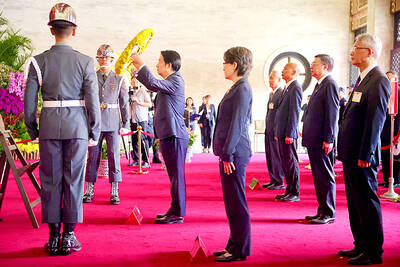France yesterday summoned the US ambassador to explain allegations by pro-transparency group WikiLeaks of what French President Francois Hollande branded “unacceptable” spying on successive French leaders.
The latest revelations of espionage among Western allies come after it emerged the US National Security Agency (NSA) had spied on Germany and that Germany’s own BND intelligence agency had cooperated with the NSA to spy on officials and companies elsewhere in Europe.
Hollande held an emergency meeting of his ministers and military commanders after revelations the NSA had spied on the last three French presidents.
French government spokesman Stephane Le Foll said a senior French intelligence official would be dispatched to the US to confirm the spying is over.
“France will not tolerate actions that threaten its security and the protection of its interests,” a statement from the president’s office said, adding that it was not the first time that allegations of US spying on French interests had surfaced. “Commitments were made by the US authorities. They need to be recalled and strictly respected.”
The French Ministry of Foreign Affairs summoned the US ambassador.
After meeting Hollande, lawmakers told reporters the French leader had informed them he would speak with US President Barack Obama later in the day.
A statement from the US National Security Council said it was not targeting and would not target Hollande’s communications, but did not say whether spying had taken place in the past.
“We have to verify this spying has finished,” Le Foll told reporters, adding that ministers were told to be careful when speaking on their mobile phones. “Between allies this is unacceptable and incomprehensible. France does not spy on its allies.”
While Paris and Washington have good ties in general, UN Security Council veto-holder France fiercely maintains its independence on foreign policy, and over the past two years, there have been moments of friction and irritation on both sides.
Hollande was disappointed by Obama’s last-minute decision not to strike Syrian government positions in 2013.
US officials have frequently, in private, lambasted France’s tough stance in talks over Iran’s nuclear program.
The revelations were first reported by French daily Liberation and on news Web site Mediapart, which said the NSA spied on former French presidents Jacques Chirac and Nicolas Sarkozy, as well as Hollande from at least 2006 until May 2012.

RESPONSE: The transit sends a message that China’s alignment with other countries would not deter the West from defending freedom of navigation, an academic said Canadian frigate the Ville de Quebec and Australian guided-missile destroyer the Brisbane transited the Taiwan Strait yesterday morning, the first time the two nations have conducted a joint freedom of navigation operation. The Canadian and Australian militaries did not immediately respond to requests for comment. The Ministry of National Defense declined to confirm the passage, saying only that Taiwan’s armed forces had deployed surveillance and reconnaissance assets, along with warships and combat aircraft, to safeguard security across the Strait. The two vessels were observed transiting northward along the eastern side of the Taiwan Strait’s median line, with Japan being their most likely destination,

‘NOT ALONE’: A Taiwan Strait war would disrupt global trade routes, and could spark a worldwide crisis, so a powerful US presence is needed as a deterrence, a US senator said US Senator Deb Fischer on Thursday urged her colleagues in the US Congress to deepen Washington’s cooperation with Taiwan and other Indo-Pacific partners to contain the global security threat from China. Fischer and other lawmakers recently returned from an official trip to the Indo-Pacific region, where they toured US military bases in Hawaii and Guam, and visited leaders, including President William Lai (賴清德). The trip underscored the reality that the world is undergoing turmoil, and maintaining a free and open Indo-Pacific region is crucial to the security interests of the US and its partners, she said. Her visit to Taiwan demonstrated ways the

GLOBAL ISSUE: If China annexes Taiwan, ‘it will not stop its expansion there, as it only becomes stronger and has more force to expand further,’ the president said China’s military and diplomatic expansion is not a sole issue for Taiwan, but one that risks world peace, President William Lai (賴清德) said yesterday, adding that Taiwan would stand with the alliance of democratic countries to preserve peace through deterrence. Lai made the remark in an exclusive interview with the Chinese-language Liberty Times (sister paper of the Taipei Times). “China is strategically pushing forward to change the international order,” Lai said, adding that China established the Asia Infrastructure Investment Bank, launched the Belt and Road Initiative, and pushed for yuan internationalization, because it wants to replace the democratic rules-based international

WAR’S END ANNIVERSARY: ‘Taiwan does not believe in commemorating peace by holding guns,’ the president said on social media after attending a morning ceremony Countries should uphold peace, and promote freedom and democracy, President William Lai (賴清德) said yesterday as Taiwan marked 80 years since the end of World War II and the Second Sino-Japanese War. Lai, Vice President Hsiao Bi-khim (蕭美琴) and other top officials in the morning attended a ceremony at the National Revolutionary Martyrs’ Shrine in Taipei’s Zhongshan District (中山) to honor those who sacrificed their lives in major battles. “Taiwanese are peace-loving. Taiwan does not believe in commemorating peace by holding guns,” Lai wrote on Facebook afterward, apparently to highlight the contrast with the military parade in Beijing marking the same anniversary. “We